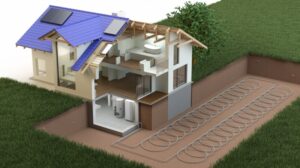Geothermal heating units are designed to be energy-saving, pollutant-reducing HVAC systems. But they aren’t without issues. These common problems could be solved with simple geothermal heating repair and bring back much-needed comfort to your home and family. Here’s what you need to know.
Heat Pump Problems
There are two different types of heat pumps for geothermal heating systems: air heat pumps and ground heat pumps. Regardless of which type you have, the most common heat pump problems come down to your compressor and fan issues in a ducted system. If you’re curious about the unique components of heat pumps, check out what makes a heat pump different from an AC.
While it’s not as common, antifreeze leaks are also possible. This can result in a drop in home comfort, although it may not be apparent at first. Antifreeze leaks may worsen as a slow leak before you realize. It’s important to get a technician to take a look at your geothermal heating system if you suspect any antifreeze leaks.
Leaking in the Ground Loop
It can be relatively easy to find out that you have a leak; it’s just finding where it is that’s the hard part. If you notice inconsistencies in your heating and cooling power or you notice freezing on the indoor coils, that means you likely have a ground loop leak. For more signs of common heating issues, see several reasons your heater isn’t working to pinpoint possible problems.
A technician will use a colored dye, feed it into the ground loop, and use it to locate the source of the leak. From there you can expect to see how big the leak is. The dye will help your technician find the source and patch it up appropriately. If all goes well, they’ll only have to dig a small hole.
Harsh Scale Build-Up
Hard water comes with its own set of problems. If your geothermal system uses hard water, calcified minerals will build up and cause blockage. It can solidify in your ground loop or in your heat pump.
Scale is the tough, white substance made up of mineral deposits from the water. This repair requires an acid flush, however it’s not something you should handle on your own. Certain chemical mixes can damage the solder on welded joints within your geothermal system.
If removing calcification comes at the cost of causing long-term damage to your heating system, it simply isn’t worth it. Your repair technician will be equipped with the right tools and solvents for the job.
Ductwork Issues
Even with geothermal heating, you still need ductwork to carry air throughout your home. Ductwork problems are either related to clogged air filters that need to be changed, or leaks in the ducts themselves. You want clean air coming into the system with no duct leaks when it’s delivered throughout your home. Change your filters and be wary of any rooms that don’t feel like they’re being heated sufficiently. If airflow issues persist, you might also explore why your heater may stay on too long as a possible concern.
It’s Time to Repair Your Geothermal Heating System
Whether it’s your pump or a leak, geothermal heating repair can’t wait. We’re here to help you restore your quality of life as quickly as possible with 24/7 emergency service and financing options available. You don’t have to live with a broken heating system any longer.
Contact us today to repair your geothermal heating system. It’s time to restore your home’s head and renew your comfort.

